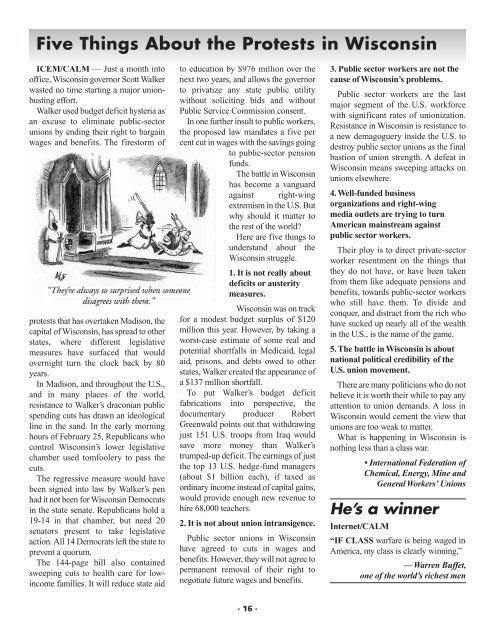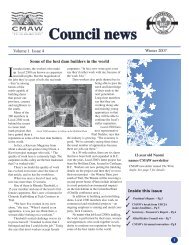Saskatchewan Regional Council of Carpenters, Drywall, Millwrights ...
Saskatchewan Regional Council of Carpenters, Drywall, Millwrights ...
Saskatchewan Regional Council of Carpenters, Drywall, Millwrights ...
You also want an ePaper? Increase the reach of your titles
YUMPU automatically turns print PDFs into web optimized ePapers that Google loves.
Five Things About the Protests in Wisconsin<br />
ICEM/CALM — Just a month into<br />
<strong>of</strong>fice, Wisconsin governor Scott Walker<br />
wasted no time starting a major unionbusting<br />
effort.<br />
Walker used budget deficit hysteria as<br />
an excuse to eliminate public-sector<br />
unions by ending their right to bargain<br />
wages and benefits. The firestorm <strong>of</strong><br />
protests that has overtaken Madison, the<br />
capital <strong>of</strong> Wisconsin, has spread to other<br />
states, where different legislative<br />
measures have surfaced that would<br />
overnight turn the clock back by 80<br />
years.<br />
In Madison, and throughout the U.S.,<br />
and in many places <strong>of</strong> the world,<br />
resistance to Walker’s draconian public<br />
spending cuts has drawn an ideological<br />
line in the sand. In the early morning<br />
hours <strong>of</strong> February 25, Republicans who<br />
control Wisconsin’s lower legislative<br />
chamber used tomfoolery to pass the<br />
cuts.<br />
The regressive measure would have<br />
been signed into law by Walker’s pen<br />
had it not been for Wisconsin Democrats<br />
in the state senate. Republicans hold a<br />
19-14 in that chamber, but need 20<br />
senators present to take legislative<br />
action. All 14 Democrats left the state to<br />
prevent a quorum.<br />
The 144-page bill also contained<br />
sweeping cuts to health care for lowincome<br />
families. It will reduce state aid<br />
to education by $976 million over the<br />
next two years, and allows the governor<br />
to privatize any state public utility<br />
without soliciting bids and without<br />
Public Service Commission consent.<br />
In one further insult to public workers,<br />
the proposed law mandates a five per<br />
cent cut in wages with the savings going<br />
to public-sector pension<br />
funds.<br />
The battle in Wisconsin<br />
has become a vanguard<br />
against right-wing<br />
extremism in the U.S. But<br />
why should it matter to<br />
the rest <strong>of</strong> the world?<br />
Here are five things to<br />
understand about the<br />
Wisconsin struggle.<br />
1. It is not really about<br />
deficits or austerity<br />
measures.<br />
Wisconsin was on track<br />
for a modest budget surplus <strong>of</strong> $120<br />
million this year. However, by taking a<br />
worst-case estimate <strong>of</strong> some real and<br />
potential shortfalls in Medicaid, legal<br />
aid, prisons, and debts owed to other<br />
states, Walker created the appearance <strong>of</strong><br />
a $137 million shortfall.<br />
To put Walker’s budget deficit<br />
fabrications into perspective, the<br />
documentary producer Robert<br />
Greenwald points out that withdrawing<br />
just 151 U.S. troops from Iraq would<br />
save more money than Walker’s<br />
trumped-up deficit. The earnings <strong>of</strong> just<br />
the top 13 U.S. hedge-fund managers<br />
(about $1 billion each), if taxed as<br />
ordinary income instead <strong>of</strong> capital gains,<br />
would provide enough new revenue to<br />
hire 68,000 teachers.<br />
2. It is not about union intransigence.<br />
Public sector unions in Wisconsin<br />
have agreed to cuts in wages and<br />
benefits. However, they will not agree to<br />
permanent removal <strong>of</strong> their right to<br />
negotiate future wages and benefits.<br />
· 16 ·<br />
3. Public sector workers are not the<br />
cause <strong>of</strong> Wisconsin’s problems.<br />
Public sector workers are the last<br />
major segment <strong>of</strong> the U.S. workforce<br />
with significant rates <strong>of</strong> unionization.<br />
Resistance in Wisconsin is resistance to<br />
a new demagoguery inside the U.S. to<br />
destroy public sector unions as the final<br />
bastion <strong>of</strong> union strength. A defeat in<br />
Wisconsin means sweeping attacks on<br />
unions elsewhere.<br />
4.Well-funded business<br />
organizations and right-wing<br />
media outlets are trying to turn<br />
American mainstream against<br />
public sector workers.<br />
Their ploy is to direct private-sector<br />
worker resentment on the things that<br />
they do not have, or have been taken<br />
from them like adequate pensions and<br />
benefits, towards public-sector workers<br />
who still have them. To divide and<br />
conquer, and distract from the rich who<br />
have sucked up nearly all <strong>of</strong> the wealth<br />
in the U.S., is the name <strong>of</strong> the game.<br />
5. The battle in Wisconsin is about<br />
national political credibility <strong>of</strong> the<br />
U.S. union movement.<br />
There are many politicians who do not<br />
believe it is worth their while to pay any<br />
attention to union demands. A loss in<br />
Wisconsin would cement the view that<br />
unions are too weak to matter.<br />
What is happening in Wisconsin is<br />
nothing less than a class war.<br />
• International Federation <strong>of</strong><br />
Chemical, Energy, Mine and<br />
General Workers’ Unions<br />
He’s a winner<br />
Internet/CALM<br />
“IF CLASS warfare is being waged in<br />
America, my class is clearly winning.”<br />
— Warren Buffet,<br />
one <strong>of</strong> the world’s richest men



